Alexander I1801 ÃÂ 1825Alexander I was the grandson of Catherine the Great. She intended to have Alexander succeed her reign however AlexanderÃÂs father took the throne as Paul I. In late 1801, a group of powerful nobles assassinated him (strangled) resulting in Alexander Itaking the throne.
The ChallengeWhen Alexander I began Tsar, Russia was facing serious problems.
1)Serfs & their horrible living conditions.
2)The large social gap between the extremely wealthy nobles and the impoverished peasants.
3)The nobles clung to their wealth (even using military force) and the lower classes had no influence. No strong middle class to press for reforms.
4)Econimically, the nation was backwards with limited infrastructure and industry.
5)Increasing fear of war with the rising power of the French under Napoleon Bonaparte.
There were many expectations placed on Alexander I to solve these problems.
He was young, handsome, talented and idealistic.
Early Attempts at ReformReforms ÃÂ changes in the fundamental structures of society.
Alexander was eager to bring about the reforms his nation urgently needed.
Alexander formed a Private Committee of four young aristocrats as advisors.
Their purpose was to ÃÂframe good laws which are the source of wellbeing for the Nation.ÃÂImprovements in government administration and public education (new schools, teacher colleges & universities).
Did not address the most urgent issue: the abolition of serfdom.
Small improvements such as banning the sale of serfs, sending disobedient serfs to Siberia & limiting the number of strokes given by the knout.
These achievements were very small considering how great the problem was.
He lacked the energy and courage to fight the nobles.
Gave up on serfdom because of the powerful opposition to reforms.
Focused on RussiaÃÂs foreign policy.
Early Foreign PolicyEurope in 1801 was in great political and social turmoil.
French Revolution ÃÂ widespread war with its neighbours (Russia involved).
Napoleon Bonaparte was rapidly increasing FranceÃÂs power.
1805 ÃÂ Russia joined Britain, Austria and Sweden in the ÃÂThird CoalitionÃÂ to control Napoleons dominating intent.
Russia faced France in battle in Austerlitz and Friedland, however lost.
Big losses forced Alexander to make peace with France in the Treaty of TilsitThe treaty stated that Russia was to turn against Britain and support NapoleonÃÂs Continental System ÃÂ a scheme designed to ruin BritainÃÂs economy by restricting the purchase of British goods.
Relations with FranceAlexander was criticized in Russia for his alliance with France.
RussiaÃÂs economy depended heavily on British imports, so Alexander continued to let British imports arrive in American ships.
Alexander had no intention of complying with the Treaty, he just wanted time to regain his military forces.
1811 ÃÂ The Treaty had ended.
Mainly because of the Continental System + RussiaÃÂs lack of support for the alliance.
France was unpopular ÃÂ Viewed as Atheists (Russia had a strong sense of religion) + France symbolized a betrayal against aristocracy.
The Patriotic WarNapoleon wanted to punish Alexander for ending the treaty.
June 1812 - He led his Grand Army across the Niemen River into Russia.
The Russian strategy was to let NapoleonÃÂs army invade. The Russians would then retreat, burning the land through which the French had to pass. This ÃÂscorched earthÃÂ policy meant that the enemy could not live off the land and had to depend on their carried supplies. As they advanced further into Russia, France suffered many supply problems.
7 September 1812 ÃÂ Russians finally fight at Borodino. Napoleon wins.
France continued to invade and finally reached Moscow but the Russians had already burnt down their capital city than let France seize it.
Retreat from MoscowNapoleon waited a month in Moscow however Alexander never backed down, knowing that the French could not stay long without shelter and supplies.
In the end, Napoleon decided to retreat before the Russian winter began.
Too late! The weather worsened and supplies became critical.
General KutuzovÃÂs units harassed the retreating army.
Napoleon lost hundreds of thousands of men in the retreat.
RussiaÃÂs victory was one of the reasons of Napoleons downfall. It severely weakened his losses and was in no position to make new alliances for security.
1813 ÃÂ Napoleon was eventually defeated by a combined force of Russians, Prussians and Australians in the ÃÂBattle of the NationsÃÂ at Leipzig.
The Congress of ViennaAfter the downfall of Napoleon, his victorious enemies met in Vienna in 1815 to decide what is to be done with France.
The congress was very conservative and decided to oppose the spread of revolutionary ideas and restore the old orders of France.
This was called the Congress System.
The Holy AllianceFranceÃÂs invasion of Russia had an immense effect on Alexander.
He became very religious and proposed at the Congress that fellow monarchs should form a brotherhood called the Holy Alliance.
Under this alliance ÃÂ all countries agree to govern their countries with justice, peace and piety with Christian ideologies.
Other nations perceived Alexander to be in a ÃÂconfused state of mindÃÂ proposing nonsense.
However many were reluctant to reject him outright because by then he was the most powerful ruler in Europe.
All leaders accepted it apart from the king of England who did not fear a Russian invasion.
This Holy Alliance had no real impact on the governing of involved nations.
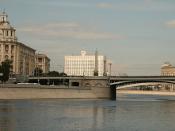
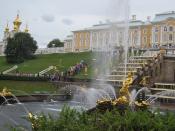
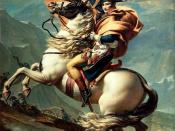
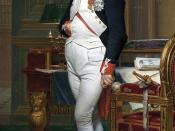
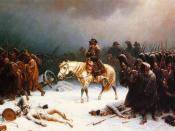
![Alexander Muir Public School, Toronto, 1902 [OHQ-PICTURES-S-R-599]](https://s.writework.com/uploads/9/95250/alexander-muir-public-school-toronto-1902-ohq-pictures-s-r-5-thumb.jpg)